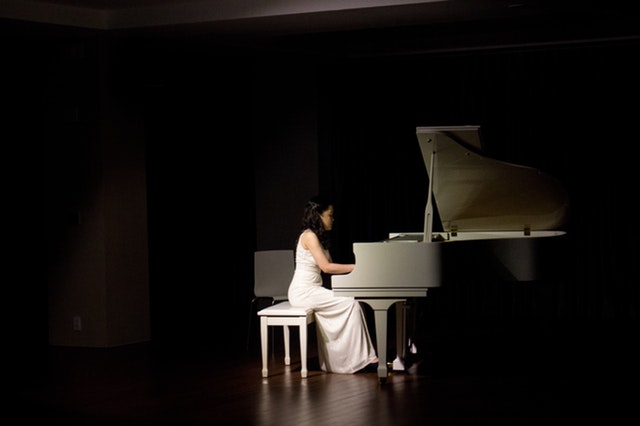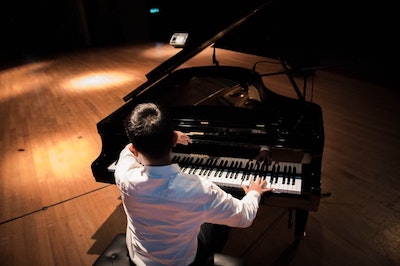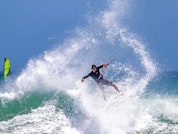Performance Anxiety: How To Deal With It
 Would you like to learn effective ways to deal with performance anxiety?
Would you like to learn effective ways to deal with performance anxiety?
Are you one of those people who sound excellent in the practice room yet fail in front of an audience?
Here’s a lesson that will help you learn how to perform without worry or fear.
In the video below, Steve teaches one of his Jazz Inner Circle students techniques to deal with performance anxiety.
Let’s get started.
Performance Anxiety Lesson Video
Before we talk about how to deal with performance anxiety, take 10 minutes to watch the video below:
Now that you have just watched the video above, let’s learn some practical steps to address stage fright.
1. How To Make Your Jazz Piano Skills Second Nature
 Here’s one fact you need to know:
Here’s one fact you need to know:
There’s always something you can do in front of people without fear or anxiety.
In most cases, you can walk in front of people.
You can eat a meal, ride a bike, go for a jog, shop, type on the computer, work at your job, etc. with people watching you.
Those things are easy. You don’t even need to think about them, let alone care about what other people think.
In reality, all of the skills that you do on an everyday basis are complex skills.
These skills have been developed over time through consistent practice that they have become second nature to you.
Skills that have already been hardwired and are second nature happen with success in an instant.
It doesn’t matter if there is only one person or a million people watching.
The first step to alleviating performance anxiety is practice jazz piano consistently.
 Make practicing playing jazz piano an everyday habit.
Make practicing playing jazz piano an everyday habit.
When you accumulate practice hours, those skills get burned into your brain that you can do them instantly out of habit.
As Carlos Santana once said, the goal is to perform music as if it was as natural as brushing your teeth or combing your hair.
You can only get there by being always prepared for performance with regular, consistent practice.
But what if you start clamming up despite being prepared?
2. How To Handle “Skill Decline” Due To Performance Anxiety
 It’s very common for people to do really really well at a high level in the practice room but then perform less than spectacular on stage.
It’s very common for people to do really really well at a high level in the practice room but then perform less than spectacular on stage.
It’s as if your level suddenly dropped a great number of notches down when it’s time to perform.
However, this shouldn’t be the case.
One of the keys to a confident performance is working on the practice room at a really high level but performing at levels way lower.
Here’s an example: Let’s say you have to play a piano exam in front of a jury. How do you prepare for that and succeed?
Practice the song of your choice at a more difficult level than required. Of course, it’s necessary to build your skills up for this gradually.
When it’s time to perform, play your song at a level that is so easy for you that mistakes are close to impossible.
Perform at a level you are confident at. This way, you’re not struggling during a performance.
Struggling at a high level leads to tension and an increasing desire to stop. By playing at a level you are confident at, you will be more relaxed and be successful.
But what if you feel pressure? How do you handle that?
Let’s move on to the next step.
3. How To Deal With Pressure
 Here are some high-pressure situations when performing music:
Here are some high-pressure situations when performing music:
- Playing in front of your teacher.
- Playing in front of a jury.
- Playing in front of a high-profile audience.
Here’s a good example of performing with excellence even under pressure:
In the video above, you can see Frank Gambale just improvising well even when legendary musicians such as Allan Holdsworth and Jeff Berlin are watching.
Dealing with that kind of pressure involves a couple of things:
- Putting trust in skills that you have already developed.
- Thinking only of the process of performing and nothing else.
- Psyching yourself up by saying to yourself something like, “Let’s do this!”, just before performing.
- Disregarding your own expectations as well as the expectations of other people during a performance.
- Learning how to enjoy the moment.
- Using that “nervous” energy to psych yourself up to perform.
That “nervous” energy coming from adrenaline causes us to go in a fight or flight response.
You can learn how to harness that energy to even upgrade your performance.
The key here to alleviate performance anxiety is not to fight that adrenaline rush.
Control your breathing and go along with it.
To get used to that adrenaline rush, you have to simulate it in the practice room.
How To Get Used To The Adrenaline Rush Or Nervousness
 Here are the steps to practice getting used to nervous energy while performing:
Here are the steps to practice getting used to nervous energy while performing:
- Work out briefly before practicing on the piano. A cardio workout is best for this purpose to elevate your heart rate to the max.
- Take a couple of slow, deep breaths before playing the piano.
- Say to yourself a motivating phrase like “Let’s do this!” or “Let’s go!”
- Perform your song without stopping for mistakes.
- Reward yourself when you are done performing.
- Repeat steps 1 to 5 every practice session.
Now, did you know that your audience can actually help you relieve performance anxiety?
4. One Important Thing To Know About Your Audience
 More often than not, performance anxiety comes from the fear of displeasing yourself and others.
More often than not, performance anxiety comes from the fear of displeasing yourself and others.
Here’s one thing to remember when playing in front of any person:
They sacrificed something just to see and hear you perform.
Therefore, in many cases, these people who came to hear you want give you some love.
Here are some examples:
- Your teacher sacrificed time and effort to prepare for your lesson, listen, and teach you.
- Your audience made sacrifices by dressing up nicely, commuting to the venue, and even spending money to get entrance to your performance and have a good time.
- The jury in your piano exam made time to hear you play to evaluate you and guide you in the right direction.
Keep in mind though that you won’t be able to please everybody. That’s always a risk when performing.
Have the mindset that playing music makes you happy. You want to share those feelings with your audience as well.
Since they sacrificed something just to see you, they will appreciate that.
5. One Big Secret To Performing Well Despite Performance Anxiety
 Mistakes happen. We’re human after all.
Mistakes happen. We’re human after all.
It’s very common for people performing to have anxiety over making mistakes when it comes to every element of music.
Sometimes those are unavoidable.
Despite those possibilities, here’s one big secret to performing well: Don’t stop when you make a mistake.
Remember that only about 1% to 2% of your audience will notice mistakes in pitch such as chord voicings, note choice, etc.
I’m not saying that never work on your mistakes. Of course, you need to work hard on preventing them from happening by practicing correctly.
However, all of your audience will notice any problems in time feel, rhythm, or groove.
Stopping to correct mistakes messes up the groove big time.
Again, never stop playing when you make a mistake.
Maintain that groove. Even if you make a mistake, your music will feel great when you keep the groove going.
If you need more help at a personalized level, read on.
How To Hit The Stage Like The Pros
 Are you still terrified of performing in front of people?
Are you still terrified of performing in front of people?
Are you afraid of “dropping the ball” at a crucial moment?
Perhaps you have looked into things like beta-blockers and self-help guides, only to find yourself forgetting all of that when you hit the stage.
Maybe you still lack the experience.
Everybody learns from experiences, but the wisest of them all learn from the experience of others.
There’s no better way of learning than from the experience of pros inside the Jazz Inner Circle.
Our instructors in the Jazz Inner Circle are award-winning, critically acclaimed, world-touring jazz pianists. It’s an understatement to say that they know a thing or two about dealing with performance anxiety.
Guess what: You can learn tried and tested methods of handling performance anxiety inside the Jazz Inner Circle.
 Inside the Jazz Inner Circle, you’ll discover:
Inside the Jazz Inner Circle, you’ll discover:
- Private 1:1 lessons with a Jazz Inner Circle instructor.
- “The Jazz Piano Mastery Program” (Over $25,000 worth of jazz piano training resources, tools, practice templates, improv strategies, & tons more.)
- “The Ultimate Jazz Workout Training System.” This is where we implement a complete practice program to build your jazz piano talent in record time.
Train with us on a 1-on-1 basis here.
I hope that you enjoyed this lesson on how to deal with performance anxiety.
If you have any questions, comments, or suggestions for other lessons, feel free to leave a comment below.
Always remember we’re here to help you become a better musician. Thanks.
